See also
| This disambiguation page lists articles associated with the title Fulani. If an internal link led you here, you may wish to change the link to point directly to the intended article. |
Fulani may refer to:
| This disambiguation page lists articles associated with the title Fulani. If an internal link led you here, you may wish to change the link to point directly to the intended article. |

The Fula,Fulani, or Fulɓe people are one of the largest ethnic groups in the Sahel and West Africa, widely dispersed across the region. Inhabiting many countries, they live mainly in West Africa and northern parts of Central Africa but also in South Sudan, Sudan, and regions near the Red Sea coast. The approximate number of Fula people is unknown due to clashing definitions regarding Fula ethnicity; various estimates put the figure between 25 and 40 million worldwide.
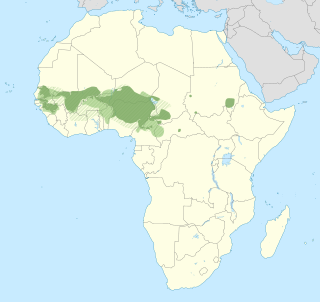
Fula, also known as Fulani or Fulah, is a Senegambian language spoken as a set of various dialects in a continuum that stretches across some 20 countries in West and Central Africa. Along with other related languages such as Serer and Wolof, it belongs to the Senegambian branch within the Niger–Congo family, which does not have tones, unlike most other Niger–Congo languages. More broadly, it belongs to the Atlantic geographic grouping within Niger–Congo. It is spoken as a first language by the Fula people from the Senegambia region and Guinea to Cameroon, Nigeria, and Sudan and by related groups such as the Toucouleur people in the Senegal River Valley. It is also spoken as a second language by various peoples in the region, such as the Kirdi of northern Cameroon and northeastern Nigeria.
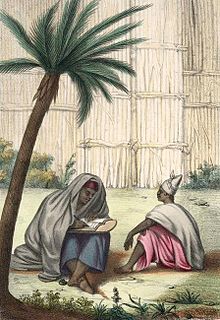
The Toucouleur people, also called Tukulor or Haalpulaar are a West African ethnic group native to Futa Tooro region of Senegal. There are smaller communities in Mali and Mauritania. The Toucouleur were islamized in the 11th century; their early and strong Islamic heritage, which is seen as a defining feature, is a "matter of great pride for them". They have been influential in the spread of Islam to West Africa in the medieval era, later founded the vast Toucouleur Empire in the 19th century under El Hadj Umar Tall that led a religious war against their neighboring ethnic groups and the French colonial forces.
Fula may refer to:
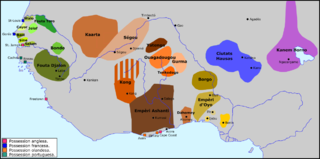
Futa Toro, often simply the Futa, is a semidesert region around the middle run of the Senegal River. This region is along the border of Senegal and Mauritania. It is well watered and fertile close to the river, but the interior parts of the region away from the river is porous, dry and infertile. This region is historically significant for the Islamic theocracies, Fulani states, jihad armies and migrants for Fouta Djallon that emerged from here.

The Wodaabe, also known as the Mbororo or Bororo, are a small subgroup of the Fulani ethnic group. They are traditionally nomadic cattle-herders and traders in the Sahel, with migrations stretching from southern Niger, through northern Nigeria, northeastern Cameroon, southwestern Chad, western region of the Central African Republic and the northeastern of the Democratic Republic of Congo. The number of Wodaabe was estimated in 2001 to be 100,000. They are known for their elaborate attire and rich cultural ceremonies.
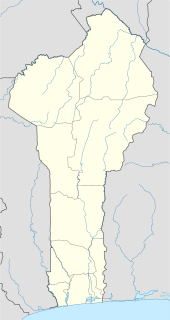
Tchaourou is a commune, arrondissement, and city located in the Borgou Department of Benin, a country in Western Africa, formerly known as Dahomey. It is the birthplace of former Beninese president Yayi Boni. It is 50 kilometres (31 mi) south of Parakou.
Lamido is the Anglicisation of a term from the Fula language or Fulfulde, used to refer to a ruler. In the language it is properly laamiiɗo, derived from the verbal root "laamu-" meaning "leadership", and hence may be translated more specifically as "leader". The title "laamiiɗo" is higher in rank than "laamɗo", which means simply a "leader" or "king". Therefore, "laamiiɗo" means a "great king" or "great leader". It has been used by the traditional leaders of certain Fulani emirates in West Africa, originally as head of confederations of ruling and subordinate states. Its use persists within a number of post-colonial republics.
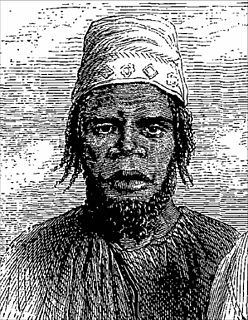
The Yalunka, also spelled Jalanke, Jalinke, Jallonke, Jalonke, Jaloonke, Jalonca, Jalonga, Jallonka, Jalonka, Jalunga, Jallunka, Jalunka, Jallunke, Jalunke, Jalunko, Yalonka, Yalonke, Yalunke, Yalunko, Jalounka, Jalounke, Yalonga, Yalounka, Yalounke, Dialanké, Dialinké, Diallonka, Dialonka, Diallonké, Diallounka, Dialounka, Diallounké, Dialounké, Djallonka, Djalonka, Djallonké, Djalonké, Djallounka, Djalounka, Djallounké, Djalounké, Dyalonka, Dyalonké, Dyalounka, or Dialonké, are a Mande people who were one of the original inhabitants of the Futa Jallon, a mountainous region in Guinea, West Africa. According to Henry Louis they have lived there since the eleventh century. The name Jalonke literally means "inhabitants of the Jallon (mountains)".
The Fula language is written primarily in the Latin script, but in some areas is still written in an older Arabic script called the Ajami script or with its own script called Adlam.
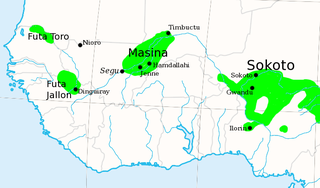
The Fulajihads were a series of jihadist wars that occurred across West Africa during the 18th and 19th centuries led largely by the Muslim Fula people. The jihads and the jihad states came to an end with European colonization.
Lau (Law) is a Jukunoid language of Lau LGA, Taraba State, Nigeria. Lau speakers claim that their language is mutually intelligible with the Jukunoid language varieties spoken in Kunini, Bandawa, and Jeshi. They also live alongside the Central Sudanic-speaking Laka, who live in Laka ward of Lau LGA.
Kankamogre-Peulh is a small town in the Bittou Department of Boulgou Province in south-eastern Burkina Faso. As of 2005, the town has a population of 960.
The Senegambian or Northern (West) Atlantic languages are a branch of Niger–Congo languages centered on Senegal, with most languages spoken there and in neighboring southern Mauritania, Guinea-Bissau, and Guinea. The transhumant Fula, however, have spread with their languages from Senegal across the western and central Sahel. The most populous unitary language is Wolof, the national language of Senegal, with four million native speakers and millions more second-language users. There are perhaps 13 million speakers of the various varieties of Fula, and over a million speakers of Serer.
Liptako is an historic region of West Africa. It today falls in eastern Burkina Faso, southwestern Niger and a small portion of southeast central Mali. A hilly region beginning on the right back of the Niger river, Liptako is usually associated with the Liptako Emirate, an early 19th-century Fulani Islamic state, founded by Brahima Saidu. With the semi nomadic Fula, the main historic population of Liptako are the Gourmantche, a minority population in each of the three nations, as well as the Mossi and Songhai. The other common name for the region, Liptako-Gourma, is a reference to the Gourmantche people.

There are numerous ethnic groups in Burkina Faso. The most predominant group are the Mossi, about 40% of the population. They are mainly farmers and live in the central portions of the country.

Cameroon has an extremely heterogeneous population, consisting of approximately 250 ethnic groups. Cameroon Highlanders constitute the plurality at 38 percent of the total population. They include the Bamileke and the Bamoun. The coastal tropical forest peoples, including the Bassa, Douala, and many smaller entities account for about 12 percent of the population. In the southern tropical forest, ethnic groups include the Ewondo, Bulu, and Fang, and the Makaa and Pygmies. They account for about 18 percent of the population. The Fulani account for about 14 percent of the population and the Kirdi account for about 18 percent.
Fula people of Sierra Leone is the third major ethnic group in Sierra Leone and a branch of the Fula people of West Africa. The Fula make up about 10% of Sierra Leone's population. The Sierra Leone Fula people settled in the Western Area region of Sierra Leone more than four hundred years ago as settlers from the Fouta Djallon Kingdom that expanded to northern Sierra Leone.

The Bauchi Emirate was founded by Fula in the early 19th century in what is now Bauchi State, Nigeria, with its capital in Bauchi. The emirate came under British "protection" in the colonial era, and is now denoted a traditional state.
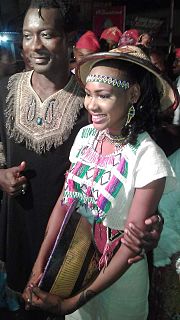
Fulani herdsmen or Fulani pastoralists are nomadic or semi-nomadic Fulani people whose primary occupation is raising livestock. The Fulani herdsmen are largely located in the Sahel and semi-arid parts of West Africa, but due to relatively recent changes in climate patterns, many herdsmen have moved further south into the savannah and tropical forest belt of West Africa. The herdsmen are found in countries such as Nigeria, Niger, Senegal, Guinea, Mauritania, Mali, Burkina Faso, Ghana, Benin, Côte d'Ivoire, and Cameroon. In Senegal, they inhabit northeastern Ferlo and the southeastern part of the country. In many of these countries the Fula often constitute a minority group.